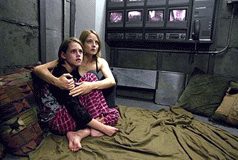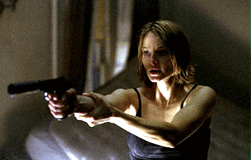|
Newest Reviews:
New Movies -
The Tunnel
V/H/S
The Tall Man
Mama Africa
Detention
Brake
Ted
Tomboy
Brownian Movement
Last Ride
[Rec]≥: Genesis
Hara-Kiri: Death of a Samurai
Indie Game: The Movie
Abraham Lincoln: Vampire Hunter
Old Movies -
Touki Bouki: The Journey of the Hyena
Drums Along the Mohawk
The Chase
The Heiress
Show
People
The Strange Affair of Uncle Harry
Pitfall
Driftwood
Miracle Mile
The Great Flamarion
Dark Habits
Archives -
Recap: 2000,
2001, 2002,
2003, 2004
, 2005, 2006,
2007 , 2008
, 2009 ,
2010 , 2011 ,
2012
All reviews alphabetically
All reviews by star rating
All reviews by release year
Masterpieces
Screening Log
Links
FAQ
E-mail me
HOME
| |
Panic Room (David Fincher) 2002
 David Fincherís Panic
Room isnít nearly the great film that his Fight Club was, but it wouldnít stun me if the director never made
a film that good again. Panicís
opening scenes, in which the cat and mouse game that dominates the film is
meticulously set up for the audience, bothered me initially, because they seemed
to be telegraphing everything that was to come so obviously. Weíre given a
tour of the premises, the medical history of the lead characters, and an
extensive explanation of the motivations of the crooks that start the trouble.
Once the filmís devious plot really took off, however, I realized that since
the director was so obviously playing a game with the audience, he kept the
oppressive urban angst that dominated his Seven
from settling in. The drab green and gray color palette and closed set where
nearly all of the action takes place are so imposing though, that it seems only
natural that they make protagonist Meg Altman (Jodie Foster) claustrophobic. A
recent divorcee, her life seems to be so determinedly getting back on track that
things are bound to go wrong.
David Fincherís Panic
Room isnít nearly the great film that his Fight Club was, but it wouldnít stun me if the director never made
a film that good again. Panicís
opening scenes, in which the cat and mouse game that dominates the film is
meticulously set up for the audience, bothered me initially, because they seemed
to be telegraphing everything that was to come so obviously. Weíre given a
tour of the premises, the medical history of the lead characters, and an
extensive explanation of the motivations of the crooks that start the trouble.
Once the filmís devious plot really took off, however, I realized that since
the director was so obviously playing a game with the audience, he kept the
oppressive urban angst that dominated his Seven
from settling in. The drab green and gray color palette and closed set where
nearly all of the action takes place are so imposing though, that it seems only
natural that they make protagonist Meg Altman (Jodie Foster) claustrophobic. A
recent divorcee, her life seems to be so determinedly getting back on track that
things are bound to go wrong.
 Since the plot is nearly disposable here, in what is an
extended exercise in style, itís fortunate that Fincherís a helmer with a
better sense of style than most. Once Meg realizes she has uninvited visitors in
her home, the suspense level ratchets up a few notches and rarely settles back
down. Using CGI effects to allow impossible tracking shots, Fincher maintains a
consistent sense of space, making the proximity of the danger always palpable.
Floorboards fade, walls disappear, and bullet wounds let loose a fountain of
blood thanks to the digital effects, but the effects are almost always used to
further an audienceís understanding of the game thatís being played. Perhaps
even more impressive than the visuals is the filmís sound design, which does
as much as the visuals do to raise tension levels. Technically, the movie is
impeccable. Less impressive, however, is some of the acting (particularly Jared
Leto), as well as the scriptís passing insistence that one of the white crooks
only wants the bounty that heís after while the black thief needs it.
Otherwise, Panic Room represents a
state of the art example of solid Hollywood filmmaking. If the movie pales a bit
in comparison to the best of De Palmaís fabulously empty thrillers, it should
be noted that not even De Palma himself seems capable of hitting his old heights
these days.
Since the plot is nearly disposable here, in what is an
extended exercise in style, itís fortunate that Fincherís a helmer with a
better sense of style than most. Once Meg realizes she has uninvited visitors in
her home, the suspense level ratchets up a few notches and rarely settles back
down. Using CGI effects to allow impossible tracking shots, Fincher maintains a
consistent sense of space, making the proximity of the danger always palpable.
Floorboards fade, walls disappear, and bullet wounds let loose a fountain of
blood thanks to the digital effects, but the effects are almost always used to
further an audienceís understanding of the game thatís being played. Perhaps
even more impressive than the visuals is the filmís sound design, which does
as much as the visuals do to raise tension levels. Technically, the movie is
impeccable. Less impressive, however, is some of the acting (particularly Jared
Leto), as well as the scriptís passing insistence that one of the white crooks
only wants the bounty that heís after while the black thief needs it.
Otherwise, Panic Room represents a
state of the art example of solid Hollywood filmmaking. If the movie pales a bit
in comparison to the best of De Palmaís fabulously empty thrillers, it should
be noted that not even De Palma himself seems capable of hitting his old heights
these days.
* * * 1/2
04/01/02
Jeremy Heilman
|